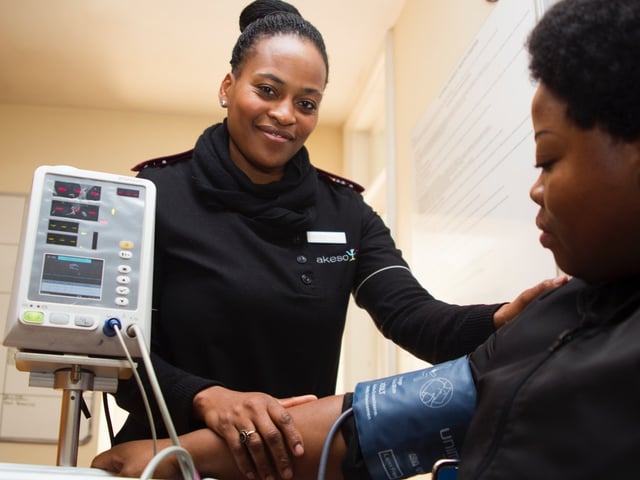
Vocabulary on the HESI Exam
Vocabulary is an important part of everyday life. From communicating a need with a loved one, to speaking to a prospective employer during a job interview, having a robust vocabulary improves your ability to accurately and efficiently speak your piece and engage meaningfully with others. The same holds true in professional medical settings.
What Is Covered in HESI Vocabulary Questions?
Students taking the Health Education Systems Incorporated (HESI) exam can expect to have their vocabulary evaluated as part of the overall “English” portion of the exam. The vocabulary section comprises 50 questions, some of them devoted to medical terminology, and others devoted to standard vocabulary you might expect to find in adult settings, though not necessarily medical ones.
A Different Approach to Vocabulary
The HESI Exam’s approach to testing vocabulary is unique and quite different from most traditional vocabulary tests you may have encountered in your academic journey. In elementary and high school, vocabulary tests typically consist of a fixed list of words for which students prepare in advance, usually provided by the teacher. This approach focuses on memorization and the ability to provide specific definitions. The HESI Exam, however, follows a different strategy.
Rather than focusing on a specific set of words, the HESI Exam evaluates a broad range of vocabulary knowledge. This approach tests not only the ability to recall definitions but also the ability to understand the meaning of words in various contexts. This reflects the real-world application of language, where understanding and communication are not limited to rote memorization but require the ability to comprehend words and their meanings in different scenarios.
This broad approach to vocabulary is especially pertinent in the field of nursing and healthcare, where effective communication is critical. Test-takers are expected to be familiar with a wide range of terms, including standard English vocabulary, medical terminology, and nursing jargon. This comprehensive vocabulary assessment ensures that nursing students are well-equipped to communicate effectively in their professional field, where they will encounter a diversity of terms and need to understand and use them correctly.
For example, you might encounter a sentence that uses the word ‘adverse’ in the context of patient symptoms. Understanding ‘adverse’ in this setting means recognizing it denotes something unfavorable or harmful. Similarly, recognizing medical terminology such as ‘bradycardia’ or ‘tachycardia’ and knowing what they mean could be the difference between correctly interpreting a critical health situation or misunderstanding it.
So, while there’s no specific list of words to memorize for the HESI Exam, broadening your general and healthcare-related vocabulary can enhance your communication skills, improve your performance on the exam, and equip you for your future career in nursing. Consider integrating regular vocabulary study into your preparation strategy, using varied sources like medical textbooks, nursing journals, and even novels to expose yourself to a wide range of vocabulary. Remember, understanding a word in context is just as important as knowing its definition.
Why Might Your Vocabulary Be Limited?
The richness of our vocabulary is influenced by several factors, including our environment, daily interactions, and habits. In fact, the circumstances surrounding our communication can often limit the range of words we use and thus, over time, restrict our vocabulary.
Environment and Interactions
One such factor is the people we interact with daily. For instance, if you spend a lot of time with children, you naturally simplify your language to match their understanding. While this is necessary for effective communication with children, it does not provide a stimulus for vocabulary expansion.
Similarly, if your interactions primarily involve casual conversation – with friends, for instance – you may find yourself repeatedly using familiar and informal words and phrases. Such environments don’t necessarily encourage the use of more complex or specialized language, which can lead to a limited vocabulary over time.
Education and Reading
Another potential reason for a limited vocabulary can be a lack of recent formal education or learning activities. Schools and universities often expose students to a wide array of topics and terminology, thus enriching their vocabulary. If you’ve been out of such an environment for a while, your exposure to new words may have reduced.
Reading is known to be one of the most effective ways to expand vocabulary. If you read less frequently – or focus mainly on materials with simple language – you might not encounter a broad range of words and phrases. Regularly reading diverse materials, such as academic articles, books from different genres, newspapers, and the like, exposes you to new words and their contexts, helping to enrich your vocabulary.
Preparing for the HESI Exam
When preparing for an exam like the HESI, it’s crucial to recognize these limitations and work on expanding your vocabulary. This involves reading widely, having more varied conversations, and intentionally learning new words, including medical terminology. Fortunately, many resources can help you do this, including vocabulary books, flashcards, online vocab courses, and medical journals.
Remember, improving your vocabulary is not just about memorizing definitions. It’s also about understanding how words are used in context and being able to apply them appropriately. This comprehensive grasp of vocabulary can greatly enhance your communication skills, which are vital for any healthcare professional.
General Vocabulary Preparation
In order to excel in the general vocabulary section of the HESI exam, it is essential to cultivate a broad and rich vocabulary. This task can be achieved through various effective strategies, one of the most powerful being regular reading. This habit not only introduces you to new words but also provides a clear understanding of how they are used in context. Let’s delve deeper into how different forms of reading can contribute to vocabulary enhancement:
-
Reading Newspapers: Newspapers can expose you to a wide array of words used in various contexts and subjects, from politics to science, and culture to health. It also keeps you abreast of current events, which could potentially be referenced in the exam.
-
Novels and Non-fiction Books: Novels, particularly those set in different eras or cultural backgrounds, are excellent sources of diverse vocabulary. Non-fiction books, on the other hand, often use more formal and specialized language, depending on the subject matter, making them a great resource for learning new words.
-
Expanding Genres: Don’t limit yourself to one genre or type of book. Different genres, such as science fiction, history, biographies, or self-help books, introduce unique sets of vocabulary and language styles.
-
Vocabulary Exercises: In addition to reading, regular vocabulary exercises can be beneficial. There are various apps, websites, and books designed to help you learn and practice new words.
-
Daily Use and Practice: Attempt to use newly learned words in your daily conversations and writing. This practice helps to reinforce your memory of these words and their meanings.
Medical Terminology Preparation
Medical terminology is the cornerstone of effective communication in healthcare, enabling professionals to relay complex information in a clear, precise, and efficient manner. Given the pivotal role it plays, the HESI exam includes a section dedicated to evaluating your grasp of this specialized vocabulary.
Preparing for the medical terminology portion of the exam calls for a multipronged approach:
1. Reading Medical Journals
Medical journals are treasure troves of rich, field-specific vocabulary. Not only will you encounter an array of medical terms in context, but you’ll also stay updated with the latest findings and advancements in healthcare. This practice enhances your comprehension of the terms and helps cement their meanings in your memory.
2. Revisiting Old Textbooks
Your old medical textbooks can prove extremely useful in your preparations. They contain a wealth of medical terminology that you’ve previously studied, offering an opportunity for revision. The diagrams, explanations, and examples provided can help you to better understand and remember these terms.
3. Recognizing Prefixes and Suffixes
Medical terminology often employs a system of prefixes and suffixes. Understanding these can help you decipher unfamiliar terms. For example, ‘osteo’ refers to bone, and ‘algia’ means pain. Therefore, a term like ‘osteoalgia’ would relate to bone pain. When you encounter prefixes or suffixes in your readings, take the time to look them up and understand their meanings. This practice will arm you with the tools to understand a wide range of medical terms.
Frequently Encountered Vocabulary on the HESI Exam
The following sections will present a collection of the type of words encountered on the vocabulary section of the HESI exam. It’s important to note that this list is not exhaustive; instead, it serves as a guide to the type and level of vocabulary you should aim to understand. These examples should be used as a starting point, providing an insight into the kinds of terms that might feature in the exam. However, continuous learning, reading, and application of new words will always be the key to expanding your vocabulary further. Let’s dive into some of these commonly used terms in the HESI exam.
General Vocabulary
-
Abate: To lessen or reduce in severity or degree. In a healthcare setting, this word might be used to describe a patient’s symptoms or pain levels.
-
Abstain: To willingly choose not to do something. Healthcare professionals may use this term when advising patients to avoid certain behaviors for their health, such as smoking or excessive alcohol consumption.
-
Adhere: To stick firmly to a surface or substance. This could be used in reference to bandages, medical tapes, or to describe a patient’s compliance to medication or treatment plan.
-
Adverse: Harmful; unfavorable. This term is often used when discussing side effects of medications or complications of a medical condition.
-
Beneficial: Having a helpful or advantageous effect. This could refer to the impact of a certain treatment, exercise, or diet on a patient’s health condition.
-
Cognition: The mental processes involved in gaining knowledge and comprehension, including thinking, knowing, remembering, judging, and problem-solving.
-
Compensatory: Offset or made up for. In a healthcare context, this could relate to compensatory mechanisms in the body that work to maintain homeostasis.
-
Contingent: Dependent on; conditional. This term is used to describe outcomes that are dependent on certain conditions.
-
Discrepancy: A lack of compatibility or similarity between two or more facts or items.
-
Efficacy: The ability to produce a desired or intended result. This term is often used to discuss the effectiveness of a treatment or intervention.
-
Implication: The conclusion that can be drawn from something, even though it is not explicitly stated. In a medical context, this could refer to understanding the potential consequences of a health condition or course of treatment.
-
Mitigate: To make less severe, serious, or painful. Healthcare professionals often work to mitigate symptoms or adverse effects of a disease or its treatment.
-
Nullify: To make legally null and void; invalidate. This term could be used in legal health contexts, perhaps relating to health policies or insurance.
-
Predisposition: A liability or tendency to suffer from a particular condition, hold a particular attitude, or act in a particular way. Often used in medical discussions about genetic or environmental factors that increase the likelihood of certain health conditions.
-
Prognosis: The likely course of a disease or ailment; a forecast of the likely course of a disease or ailment.
Medical Terminology
-
Anemia: A condition characterized by a deficiency of red cells or of hemoglobin in the blood, resulting in pallor and weariness.
-
Atherosclerosis: A disease of the arteries characterized by the deposition of fatty material on their inner walls. This condition can lead to heart diseases, including heart attacks and strokes.
-
Bradycardia: Abnormally slow heart action. This might be discussed in relation to certain heart conditions or as a side effect of some medications.
-
Diuretic: A substance or drug that promotes diuresis, the increased production of urine. These are often prescribed for conditions like high blood pressure and edema.
-
Dyspnea: Difficulty in breathing. A common symptom in many health conditions such as asthma, COPD, or heart failure.
-
Hematoma: A solid swelling of clotted blood within the tissues. This term is often used in situations involving injury or surgery.
-
Hyperglycemia: Excess of glucose in the bloodstream. A common term in discussions about diabetes management.
-
Hypertension: Abnormally high blood pressure. A prevalent chronic condition that healthcare professionals deal with regularly.
-
Prophylaxis: Measures taken to maintain health and prevent the spread of disease. This term is commonly used in healthcare settings to refer to preventive treatments or actions.
-
Vasodilation: The dilatation of blood vessels, which decreases blood pressure. This term is often encountered in discussions about the circulatory system or treatments for high blood pressure.
By expanding your general and medical vocabulary, you can be better prepared for the HESI exam. This involves not only understanding the definitions but also being able to apply these terms in appropriate contexts.
Remember to approach vocabulary learning as a continuous process, integrating new words into your everyday use to help them stick. With diligent study and practice, you can enhance your vocabulary skills and increase your chances of doing well on the HESI exam.
Keep Reading

Health Education Systems Incorporated Exam Blog
HESI Anatomy and Physiology Review: A Comprehensive Guide
As you prepare for the Health Education Systems, Inc (HESI) Admission A…

Health Education Systems Incorporated Exam Blog
How to Pass the HESI Exam: A Comprehensive Guide to Acing Your Nursing Entrance Exam
If you’re considering becoming a nurse, the HESI exam can be a crucial …

Health Education Systems Incorporated Exam Blog
The Complete Guide to HESI Exam Scores
Are you ready to become a nurse? Many nursing schools require entrance …